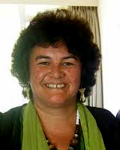“Imagine all of your aunties and uncles on a marae doing a plan [for their collective development]. Different ideas, different perspectives, whānau dynamics and four/ five hours together really dreaming about the future. Some whānau have never dreamed before.”
Kataraina Pipi is an Auckland based independent evaluator. She works as a researcher and facilitator, and has over 15 years experience within this field- with a focus on Māori and Māori development.
I was lucky enough to have met Kataraina on two occasions when first being introduced to the world of evaluation early this year. On both occasions Kataraina came across as a highly skilled evaluator and researcher. On one occasion I got to hear her present work on facilitating the PATH (Planning Alternative Tomorrows with Hope) tool within whānau and communities all around the country. What fascinated me was how personal this method of research and community development took into consideration the unique position in which different whānau and communities were placed, and highlighted and made important this position. This, for me, is a good example of a tool that promotes Whānau Ora.
During a recent interview with Kataraina we discussed her current work involving Action Research within the Whanau Ora initiative, and work involving the PATH tool- which has been featured on the Whanau Ora research website previously. PATH is utilised within her work in facilitating Whānau planning, community planning, and also training people in becoming effective facilitators of this tool.
The PATH is a planning tool that can be used in a number of different areas, professionally and personally. It helps people to reflect upon where they are in terms of their current goals and dreams, their uniqueness, attributes and strengths,and their aspirations for the future (K, Pipi, 2010). It has wide success within disability sectors, professional environments and within whānau communities. As a visual tool, the PATH facilitates a means of putting down what goals or dreams an individual or collective might have. Whether it be to get their learner license or create a means of gaining access to better health care within their community.
“It’s being used to help people with gambling problems, to help people with addictions, to plan for their health, plan for their careers.”
Kataraina recalls numerous stories of success over the years, of whānau and individuals being able to clearly outline their goals, think them achievable and start along the path to reaching them. She stated that just recently, after facilitating four whānau PATH plans at one of the regional marae, she got emails from whānau members saying how exciting it was for them to take part in the project. They’re describing how, “they haven’t seen change like that and they haven’t been able to see the whānau talk with one another the way that they did for a long long time.” The PATH facilitation is never the same or predictable. Kataraina stated, “different ideas, different perspectives and whānau dynamics within four or five hours together really dreaming about the future. Some whānau have never dreamed before.”
Kataraina came across the PATH tool when visiting Canada over ten years ago and was so attracted to its person centred approach, and interactive nature that she brought it back to New Zealand to use in her work. The originators of PATH were Marsha Forest, Jack Pearpoint and John O’Brien, all of whom had been involved in the disabilities sector for over 30 years.
Kataraina is looking at providing a workshop for those who have completed a PATH facilitator training course in order to provide them training in a behavioural model called TetraMap, so that both of these tools can be utilised during community facilitation. She’s also continuing work with Whānau Ora providers, as well as some evaluation work.
To get a better understanding of Kataraina Pipi’s work with PATH go to: www.pathplanningtool.co.nz
Contributed by Aneta Cram



